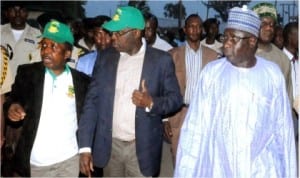Business
Nigeria’s GDP To Grow By 7% In 2014 -UN
The United Nations Economic Commission for Africa (UNECA) has listed Nigeria among selected West African nations to witness a GDP growth of 6.9 per cent in the current fiscal year.
The ECA, in its annual World Economic Outlook, released yesterday in Addis Ababa projected that the African economy would grow by 4.7 per cent GDP in 2014.
It also said there would be a growth of 5.0 per cent in 2015.
The reports, presented to journalists by the ECA’s Chief Forecaster, Adam EiHiraikia, listed Nigeria, Niger, Ghana, Liberia, Sierra Leone, Guinea and Burkina Faso among those economies.
They said there would be a growth from the 6.7 per cent in 2013 to 6.9 per cent in 2014.
“West Africa will continue to attract investment in the oil and minerals sector, a key source of growth in the sub-region, especially in countries such as Nigeria, Niger, Ghana, Liberia, Sierra Leone, Guinea and Burkina Faso.”
The UN agency also said the GDP growth would, at that, be supported by improvement in global economic and regional business environment.
It also said high commodity prices and easing infrastructure constraints, as well as increasing trade and investments from emerging economies, would help in this direction.
The agency said factors like medium-term growth prospects, increasing domestic demand from emerging class of new consumers associated with urbanisation and rising incomes would be responsible for the expected growth.
The report said inflation across Africa will decline slightly from the average 8.0 per cent in 2013 to 7.8 per cent in the current fiscal year.
It said fiscal deficit will decline from 1.8 per cent ofGDP in 2013 to 1.7 per cent in 2014.
The report, however, expressed concern that the record of economic growth in the continent had not impacted positively on the African peoples.
It said poverty remained high and income remained low and cannot meet daily demands.
It called on governments to focus more on providing infrastructure and efforts to modernise their country’s Small and Medium Enterprises for faster growth among the low income-earners.
Business
Agency Gives Insight Into Its Inspection, Monitoring Operations

Business
BVN Enrolments Rise 6% To 67.8m In 2025 — NIBSS

The Nigeria Inter-Bank Settlement System (NIBSS) has said that Bank Verification Number (BVN) enrolments rose by 6.8 per cent year-on-year to 67.8 million as at December 2025, up from 63.5 million recorded in the corresponding period of 2024.
In a statement published on its website, NIBSS attributed the growth to stronger policy enforcement by the Central Bank of Nigeria (CBN) and the expansion of diaspora enrolment initiatives.
NIBSS noted that the expansion reinforces the BVN system’s central role in Nigeria’s financial inclusion drive and digital identity framework.
Another major driver, the statement said, was the rollout of the Non-Resident Bank Verification Number (NRBVN) initiative, which allows Nigerians in the diaspora to obtain a BVN remotely without physical presence in the country.
A five-year analysis by NIBSS showed consistent growth in BVN enrolments, rising from 51.9 million in 2021 to 56.0 million in 2022, 60.1 million in 2023, 63.5 million in 2024 and 67.8 million by December 2025. The steady increase reflects stronger compliance with biometric identity requirements and improved coverage of the national banking identity system.
However, NIBSS noted that BVN enrolments still lag the total number of active bank accounts, which exceeded 320 million as of March 2025.
The gap, it explained, is largely due to multiple bank accounts linked to single BVNs, as well as customers yet to complete enrolment, despite the progress recorded.
Business
AFAN Unveils Plans To Boost Food Production In 2026
-

 News4 days ago
News4 days agoOji Clears Air On Appointment Of 15 Special Advisers By Fubara
-

 News4 days ago
News4 days agoNigeria Has Woken Up From Slumber Under Tinubu – Shettima
-

 Featured4 days ago
Featured4 days agoRivers: Impeachment Moves Against Fubara, Deputy Hits Rock …As CJ Declines Setting Up Panel
-
News4 days ago
Nigeria To Begin Exporting Urea In 2028 -NMDPRA
-
City Crime4 days ago
Health Commissioner Extols Fubara’s Commitment To Community Healthcare Delivery
-

 News4 days ago
News4 days agoKing Jaja Impacted Beyond Rivers -Deputy Gov
-

 News4 days ago
News4 days agoRivers Unveils Innovation Hub To Empower Youths, Curb Unemployment
-
News4 days ago
US – Nigeria Security Engagement Translating Into Tangible Operational Gains – NSA


